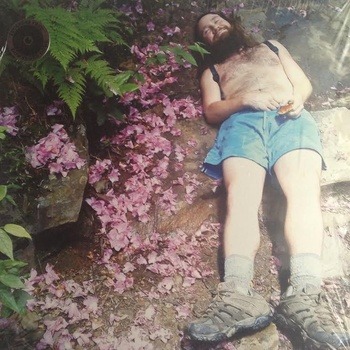Review: “Elastic Smile,” by Great Western Plain
Molly and Leopold Bloom, at the end of Ulysses, curled up in the bed all yin-yang style amidst a mess of kicked-off covers, after Joyce has put the reader through the wringer of shifting styles and narrative tones.
That book was a slog, often infuriating, yet it’s still considered one of the greats. This leads, of course, to the question: What do we want as an audience? I wonder about it sometimes, as I talk to my classes about music, or try to. By turn, they either have no idea what I’m talking about when I mention something I think is obvious or surprise me when the obscure gags I think I’m making for my own amusement somehow work. AC/DC flies over their heads, but Gainesville pop-punk sticks. I can’t figure it out.
I think it has something to with the way we listen to music. It’s fragmented into videos, ringtones, whatever, and then, in optimal cases, reassembled – either that or it’s just aped. Sometimes it’s with purpose and intention, others it’s just because “hey, I bet we can do ________.” You know this.
Both have pros and cons, certainly. And make no mistake: I love seeing few-and-far-between bands that sound like Boys Life or whoever. I ‘ve listened to all the bands playing in the emo revival looking for credible swipes of my late-90’s, pre-Dashboard rustbelt favorites. But I’m coming to understand that the same criteria still apply now as did in the past: it’s way more fun, and more rewarding, to follow trajectories rather than always looking for the New Thing.
This review comes in a week where Brick Mower’s stuff is getting some prerelease buzz, and Mark Kozelek is finding another peak in his twenty-five year cycle. It’s great: already six weeks into the year and awesome new records are popping up at a manageable-but-intense rate (or is it the other way around?). It’s nice, too, that bands I like are involved, because ultimately, despite the contentmongers and Upworthy hooks and screaming demands for clicks, this is all about conversation. The generalist in me tries to keep half an eye on everything so that I can talk to far-flung friends in bars about the latest flame, but what I really want to do is argue about the way things have evolved (rather than the way things have changed – there’s a difference).
So the fourth official release by Portland ME’s Great Western Plain fit right into this conversation: their career (though they would probably never call it that) scattered across boring miles of highway and and umpteen other bands, is easily recognizable as self-contained even as it shifts. Certainly there’s Tim’s guitar tone, which is both inviting and every bit as brittle as that Lloyd-y bit in “Kidsmoke,” and there’s Tony, who musta sank cash into both drumhead stock and supernumerary research for all the ferocity with which he pounds away back there, and there’s Mikey P with basslines conjured straight outta WMA, a fleece dream (see what I did there?) of Dinosaur and Sebadoh.
But there’s the progression, too, despite the familiarity. Their first one, “Moustache Eye Patch,” was shambly and seemingly held together by so much duct tape and the centripedal force of accelerating ideas, a less smug “Wowee Zowee.” From there it was the primal scream therapy of “Don’t Cook Off The Alcohol” to this past summer’s “Lure and Kitsch/Flutter And Slack,” which refined their pop process and shed some of the earlier tropes – Tim, for one, abandoned (or perhaps stepped out from behind) the nasal twang of the previous recs, now (really) singing in a breathy, direct drawl.
Turns out that the summer’s terse pop gems were just the hook, the lure into the suckerpunch foreshadowed by the “Youth of America”-ish sprawl of December’s (wait for it…) “Wipers” single. “Elastic Smile,” as is turns out, works to both negate and reinforce the previous records: the familiar tones and extra limbs and fuzz are all still there, but with different intent. This is announced right up front in “Thom,” perhaps a nod to the departed (to New York) guitarist of the late, lamented Whip Hands: twelve minutes influenced as much by the holy trio of Faust, Neu! and Can as by any of the previously namedropped acts. Sure, this is recognizably the same Great Western Plain, but hold it up against “Alcohol,” say, and the difference is staggeringly declared: we were there, and it was cool, but now we’re here – deal with it.
Not to say there’s no hooks here –the twentysomething riot of “Buhrlynn in a Rainy Day” is rife with ‘em, both vocally and musically, and the fourth-floor walk-up “Lights are Loud” is a yeastie swagger, to name two. And not to say it’s change for the sake of it. These records document purpose and intention. They’re part of the band’s evolution, incessant and honest, as they ingest and synthesize ideas. It’s no coincidence that a bassline which sounds not entirely unlike a break from the Minutemen’s “Glory of Man” ends the record – if you’re listening closely, you’ll recognize it as the same bassline that begins “Thom.” You know that trick, right? “Double Nickels” uses it. So does “Infinite Jest.” It’s commitment to progression, a Mobius strip: Molly and Leopold Bloom, at the end of Ulysses, curled up in the bed all yin-yang style amidst a mess of kicked-off covers, after Joyce has put the reader through the wringer of shifting styles and narrative tones.
Michael T. Fournier
Cabildoquarterly.blogspot.com
(Disclaimer/disclosure: I know these guys. They’re okay.)






